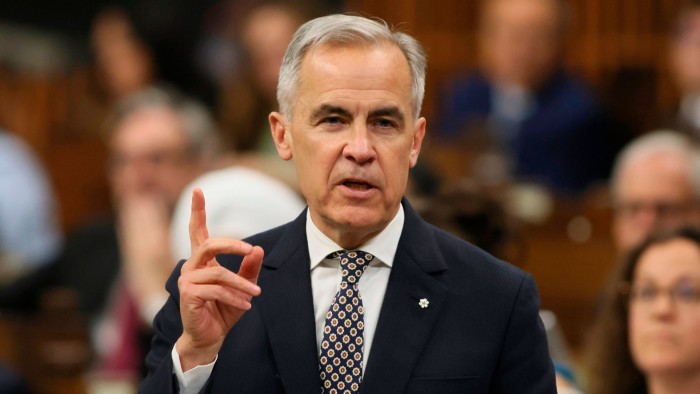Unlock the Editor’s Digest for free
Roula Khalaf, Editor of the FT, selects her favourite stories in this weekly newsletter.
Canada’s Prime Minister Mark Carney will impose measures to counter the oversupply of steel and aluminium imports and may increase levies on the US, as increasingly protectionist measures are deployed in the global tariff war over crucial industrial inputs.
Carney on Thursday said Canada had imposed 100 per cent tariffs on non-US steel and aluminium imports and on July 21 would “adjust” its 25 per cent counter-tariffs on the two metals imported from the US based on talks with Washington. The move comes after US President Donald Trump’s “catastrophic” doubling of tariffs on Canadian steel and aluminium earlier this month.
François-Philippe Champagne, Canada’s finance minister, said the quotas have been launched to “stabilise the domestic market and prevent harmful trade diversion as the result of the US actions that are destabilising markets”.
Carney added: “Steel from other countries, from third countries, starts to come into Canada if we don’t protect our industry, so we are setting these quotas.” The anti-dumping measures are probably aimed at China, on which Canada already has a 25 per cent surtax on imports of steel and aluminium.
Ottawa would also start buying Canadian steel and aluminium for domestic infrastructure projects, defence spending and the automotive industry, the prime minister said.
“Steel and aluminium workers are on the frontline of this trade crisis, these are the workers who will help us build one strong Canadian economy,” Carney said in Ottawa.
But Catherine Cobden, Canadian Steel Producers Association president, and Marty Warren, United Steelworkers union’s national director for Canada, said the government’s decision “falls short of what our industry needs”.
“We will continue to review the details of the measures and work constructively with the federal government to get a plan that works for Canadian steel producers and the thousands of workers that make up our sector,” they said in a statement.
On Monday, during the G7 summit in Kananaskis, Alberta, Carney met Trump to discuss a new economic and security partnership. “We agreed to pursue negotiations towards a deal within the coming 30 days,” the prime minister posted on X on Monday afternoon.
Trump on June 4 introduced 50 per cent tariffs on imports of steel and aluminium to the US, increasing the 25 per cent rate applied in March.
At the time, Canada’s steel industry described the doubling of the tariff as “catastrophic” for a sector that faced widespread job losses and production shutdowns.
Canada is the largest supplier of the two metals to the US, accounting for nearly a quarter of US steel imports in 2023 and about half of aluminium imports last year.
The steel sector is a C$15bn (US$11bn) industry that employs 23,000 people and supports an additional 100,000 indirect jobs, according to the CSPA.
Carney said he was in touch with Trump “frequently on a range of issues” and these latest measures would keep the steel industry afloat while Ottawa negotiates a new trade deal with the White House.



